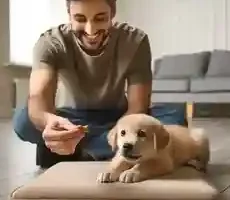Puppy bladder control chart overnight! Bringing a new puppy home is an exciting time full of cuddles and fun. But, it also comes with a bit of work, especially when it comes to potty training. One challenge many new pet parents face is understanding and managing their puppy’s bladder control overnight. Let’s dive into what you need to know to make this process as smooth as possible.
What is a Puppy Bladder Control Chart?
A Puppy Bladder Control Chart is a handy tool that helps you keep track of your puppy’s potty breaks. It shows how long your puppy can hold it overnight as they grow.
Why is Overnight Bladder Control Important for Puppies?
Overnight bladder control is super important for puppies for a few big reasons. Let’s talk about why it’s such a big deal:
- Keeps Them Healthy: When puppies learn to control their bladder, it helps prevent accidents inside the house. This is good for their health because it lowers the chance of them picking up germs from their own pee.
- Better Sleep: Just like little kids, puppies need lots of sleep to grow strong and healthy. If they learn to hold their pee overnight, they (and you!) can sleep without waking up for pee breaks.
- Happy Home: Training your puppy to control their bladder overnight makes everyone happy. Your house stays clean, and your puppy learns good habits.
- Builds Routine: Puppies love knowing what comes next. Learning to hold their bladder overnight is part of getting into a good daily routine. This helps them feel safe and happy.
- Less Stress: When puppies know they can hold it until morning, they feel less stressed. And less stress means a happier, healthier puppy.
So, teaching your puppy to control their bladder overnight is a big win for everyone!
How Often Should a Puppy Go Out at Night?
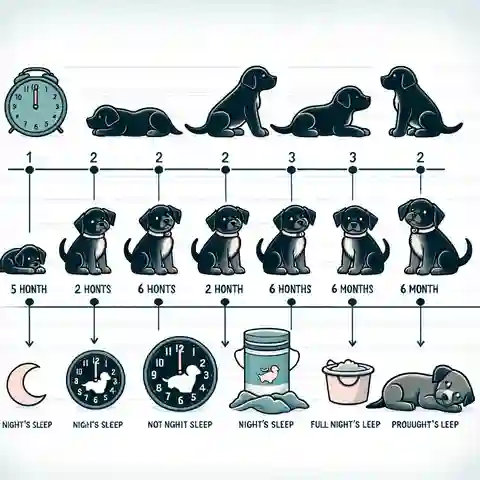
The frequency of night-time potty breaks depends on the puppy’s age, size, and development stage. Very young puppies, under 3 months old, may need to go out every 2-3 hours, even at night. As they grow older and their bladder control improves, they can start to hold it longer. By the time they are 4 to 6 months old, many puppies can sleep through the night or only need one potty break.
Why is Overnight Bladder Control Important for Puppies?
Having good bladder control overnight making sure everyone sleeps well without any surprises. Here’s why it’s super important:
- Keeps Everyone Happy and Healthy: When puppies learn to control their bladder overnight, it means they and everyone else in the house can sleep better. Good sleep is important for a puppy’s health and happiness, and for yours too!
- Less Mess to Clean Up: If puppies can hold their bladder all night, you won’t wake up to any accidents. This means less cleaning for you and a nicer environment for everyone.
- Good Habits: Learning to control their bladder helps puppies grow into well-trained dogs. It’s part of learning when and where it’s okay to go potty.
- Comfort: Just like you, puppies feel better when they don’t have to hold it too long. Getting this right means they’re comfortable and happy.
So, helping puppies learn to control their bladder overnight is super important.
What Factors Affect Puppy Bladder Control?
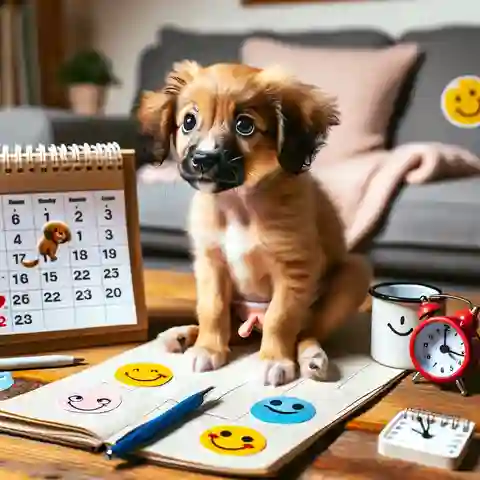
Here’s what can make a difference:
- Age: Young puppies have tiny bladders. They can’t hold it for long because they’re still growing. As they get older, they can hold it longer.
- Size and Breed: Smaller puppies usually need to go more often than bigger ones. Some breeds are known to pick up on potty training quicker than others.
- Eating and Drinking Habits: What and when puppies eat and drink can change how often they need to go out. Drinking lots of water before bed means more trips outside.
- Health: Sometimes, if a puppy has trouble holding it, it might be because they’re not feeling well. Always check with a vet if you’re worried.
- Training and Routine: Puppies do well with a schedule. Knowing when it’s time to eat, play, and sleep helps them learn when it’s time to go potty too.
- How They’re Feeling: Just like you, if puppies are super excited or a bit scared, they might forget their training. Being calm and happy helps them remember.
Understanding these factors helps you and your puppy work on bladder control together.
How Can You Track Your Puppy’s Overnight Bladder Control?
Improving your puppy’s overnight bladder control is like being a detective. You’re on a mission to help your furry friend learn to hold it through the night. Here’s a simple guide to get you started:
- Make a Chart: Keep a notebook handy. Jot down when your puppy eats, drinks, plays, sleeps, and goes potty. Spotting patterns helps a lot.
- Use a Calendar: Put a big happy sticker on each night your puppy stays dry. It’s fun to see how well you’re both doing!
- Set Alarms: Set your clock to wake up for potty breaks during the night. Keep track of when your puppy goes. It helps find the best times for breaks.
- Notice Changes: Keep an eye on any new stuff, like different food or extra play, which might make your puppy need to go out more often.
What Are the Signs That a Puppy Needs to Go Out at Night?
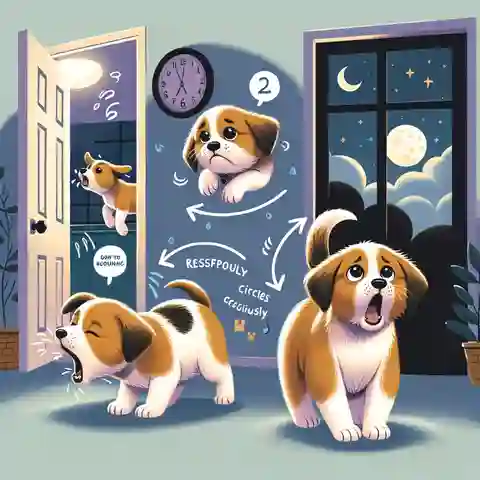
Puppies have special ways of saying, “I need to go potty!” Watch for these hints:
- Whining or Barking: Noise might mean “potty time.”
- Sniffing Around: Sniffing around a lot can mean they’re looking for a spot.
- Circling or Restlessness: Can’t sit still? It’s probably time.
- Heading to the Door: Walking to the door is a clear sign they’re ready to go out.
How Can You Help Your Puppy Develop Better Bladder Control?
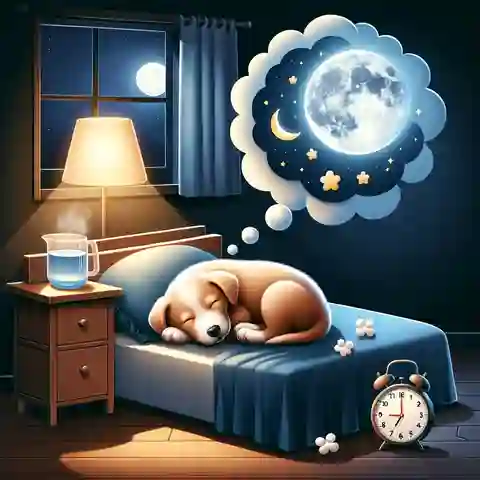
Being a coach for your puppy means helping them master potty training. Try these tips:
- Regular Breaks: Go outside often, especially after eating, drinking, or waking up.
- Praise and Treats: Celebrate outdoor potty success with cheers and treats.
- Set a Routine: A steady schedule for everything makes learning easier.
- Limit Water Before Bed: Less drinking before sleep helps, but make sure your puppy isn’t thirsty.
- Cozy Bedtime: A warm, close sleeping spot makes nighttime easier.
Understanding the signs, and helping your puppy, you’re on your way to successful overnight bladder control. It’s all about teamwork!
What Should You Do If Your Puppy Has an Accident Overnight?
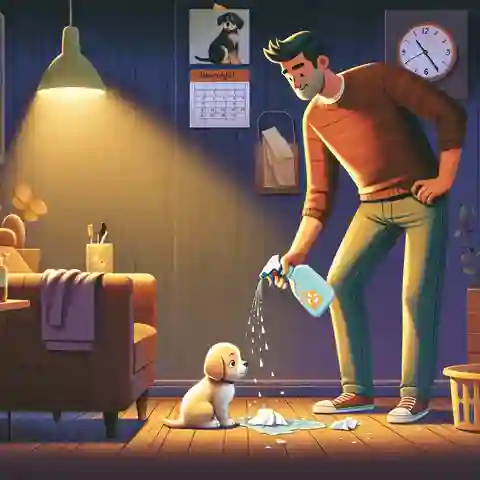
Oops! If your puppy has an accident overnight, don’t worry. It’s part of learning. Here’s what to do:
- Stay Calm: Don’t get mad or upset. Your puppy didn’t mean to have an accident.
- Clean It Up Well: Use a cleaner that gets rid of the smell so your puppy doesn’t think it’s okay to go there again.
- Think About Why: Was it a long time since their last potty break? Did they drink lots of water before bed? This can help you stop it from happening again.
- Go Back to Training: Keep working on potty training and giving lots of chances to go outside.
Are There Specific Breeds That Struggle More With Bladder Control?
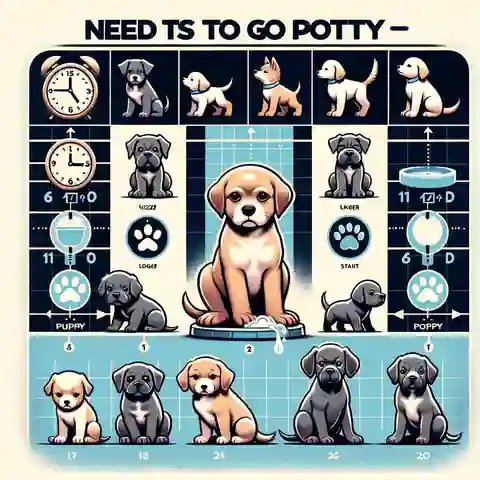
Yes, some breeds might find it a bit harder to hold their bladder. Smaller breeds like Chihuahuas, Dachshunds, and Toy Poodles can have a harder time because they’re small and have tiny bladders. But remember, every puppy is different. Training and patience help every puppy get better at it.
What Are Some Common Mistakes Owners Make Regarding Overnight Potty Breaks?
When teaching puppies to control their bladder overnight, even the best pet parents might make some mistakes. Knowing what these are can help you avoid them:
- Skipping the Last Potty Break: Not going out one last time before bed can mean a long night with a full bladder. Always try for a final bathroom trip.
- Too Much Water Late: Letting your puppy drink lots of water right before bed is a no-no. Cut back on water before bedtime, but ensure they’re not thirsty.
- Ignoring Puppy Signals: Puppies might whine or pace when they need to go. Missing these hints can lead to messes.
- Getting Mad at Accidents: Getting upset over accidents can scare your puppy, making potty training even tougher.
- Lack of Routine: Puppies thrive on routine. Eating, playing, and potty breaks should happen at similar times each day. Changing this too much can confuse them.
Can Crate Training Help With Overnight Bladder Control?
Crate training can be a huge help with overnight bladder control. Here’s how:
- Safe Space: A crate is a cozy spot for sleep, not messes. Puppies don’t like to soil where they sleep.
- Limits Space: A smaller, contained area reminds puppies to hold it until they’re outside.
- Routine Helper: A crate signals bedtime, helping your puppy know it’s time to sleep, not play.
- Reduces Accidents: A right-sized crate discourages accidents. It should be just large enough for your puppy to stand, turn around, and lie down comfortably.
Crate training should always be a positive experience. It’s meant to give your puppy a safe, happy place, not as a punishment.
When Should You Consult a Vet About Your Puppy’s Bladder Control?
If you notice these things, it might be vet time:
- Accidents After Being Trained: If your puppy was doing well but starts having accidents, something might be up.
- Struggling to Go: If they seem to have trouble or it looks painful, that’s a red flag.
- Going Way Too Often: If it’s more than usual and they can’t hold it, check with a vet.
- Weird Smell or Color: If their pee looks odd or smells strong, it’s a good idea to get it checked.
8-Week-Old Puppy Bladder Control Chart Overnight
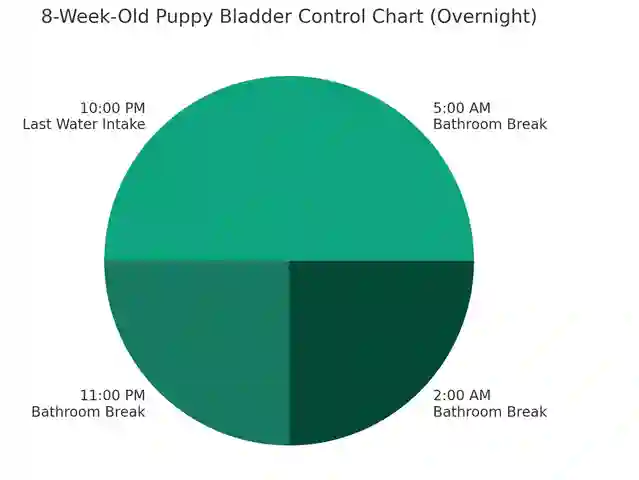
At 8 weeks old, puppies have very limited bladder control. Expect to take them out at least every 2-3 hours, even during the night.
4-Month-Old Puppy Bladder Control Chart Overnight
By 4 months, puppies can usually hold their bladder for longer periods, but overnight breaks may still be needed.
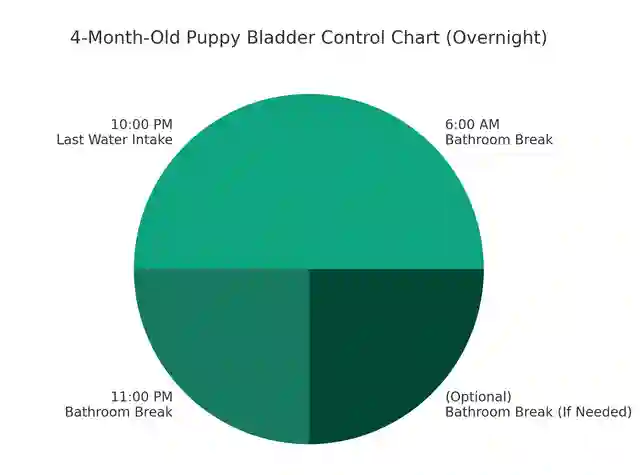
Are There Any Tools or Products That Can Help With Overnight Bladder Control?
Tools and Products for Overnight Bladder Control:
- Pee Pads: Ideal for emergency situations or when going outside isn’t an option.
- Waterproof Bed Covers: Protects the sleeping area, making clean-ups easier.
- Potty Bells: A great way for your puppy to signal when it’s time to go outside.
- Crate: A cozy space for your puppy that encourages them to hold their bladder.
How to Toilet Train a Puppy in 7 Days
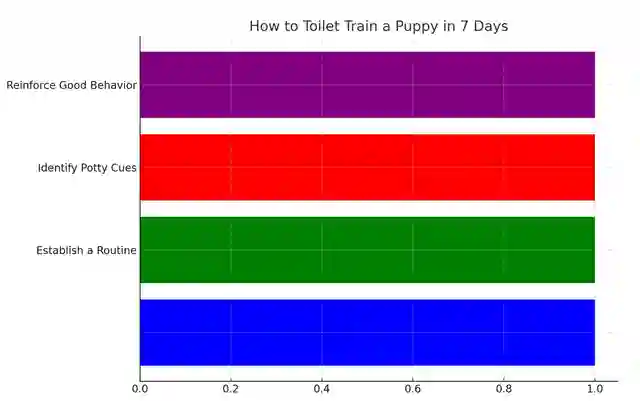
Toilet training your puppy in 7 days:
Days 1-2: Establish a Routine
- Set fixed times for meals, potty breaks, and sleep.
- Frequent outings every 2 hours, post meals/drinks, and following play.
Days 3-4: Identify Potty Cues
- Observe and respond to cues like sniffing or circling by immediately taking them outside.
- Introduce a consistent command like “go potty.”
Days 5-6: Reinforce Good Behavior
- Reward with praise or treats right after successful outdoor potty breaks.
- Keep up with the established routine, showing patience.
Day 7: Adjust and Monitor
- Begin to extend the time between outings carefully.
- Watch for any setbacks, adjusting the routine as necessary.
How Does Diet and Water Intake Affect Overnight Bladder Control?
What your puppy eats and drinks can really change how often they need to go potty. Here’s how:
- Water: Drinking lots of water is good, but try not to let your puppy drink a huge amount right before bed. They might need to go out more often.
- Food: Feeding your puppy too late can make them need to go out during the night. Try to have meal times earlier in the evening.
- Quality of Food: Good food that’s right for puppies can help their body work better. This means they might have better control over their bladder.
helping your puppy with overnight bladder control is a team effort. With love, patience, and some smart tricks, you and your puppy can get through the night dry and happy!

